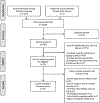Complex Systems Approaches to Diet: A Systematic Review
- PMID: 31326011
- PMCID: PMC6650152
- DOI: 10.1016/j.amepre.2019.03.017
Complex Systems Approaches to Diet: A Systematic Review
Abstract
Context: Complex systems approaches can help to elucidate mechanisms that shape population-level patterns in diet and inform policy approaches. This study reports results of a structured review of key design elements and methods used by existing complex systems models of diet.
Evidence acquisition: The authors conducted systematic searches of the PubMed, Web of Science, and LILACS databases between May and September 2018 to identify peer-reviewed manuscripts that used agent-based models or system dynamics models to explore diet. Searches occurred between November 2017 and May 2018. The authors extracted relevant data regarding each study's diet and nutrition outcomes; use of data for parameterization, calibration, and validation; results; and generated insights. The literature search adhered to PRISMA guidelines.
Evidence synthesis: Twenty-two agent-based model studies and five system dynamics model studies met the inclusion criteria. Mechanistic studies explored neighborhood- (e.g., residential segregation), interpersonal- (e.g., social influence) and individual-level (e.g., heuristics that guide food purchasing decisions) mechanisms that influence diet. Policy-oriented studies examined policies related to food pricing, the food environment, advertising, nutrition labels, and social norms. Most studies used empirical data to inform values of key parameters; studies varied in their approaches to calibration and validation.
Conclusions: Opportunities remain to advance the state of the science of complex systems approaches to diet and nutrition. These include using models to better understand mechanisms driving population-level diet, increasing use of models for policy decision support, and leveraging the wide availability of epidemiologic and policy evaluation data to improve model validation.
Copyright © 2019 American Journal of Preventive Medicine. Published by Elsevier Inc. All rights reserved.
References
-
- Railsback SF, Grimm V. Agent-based and individual-based modeling: a practical introduction. Princeton University Press; 2012.
Publication types
MeSH terms
Grants and funding
LinkOut - more resources
Full Text Sources
Miscellaneous


